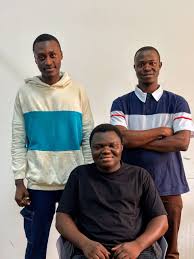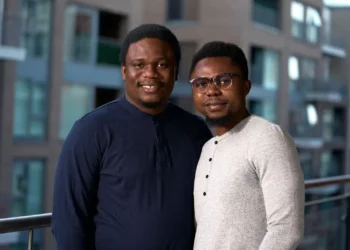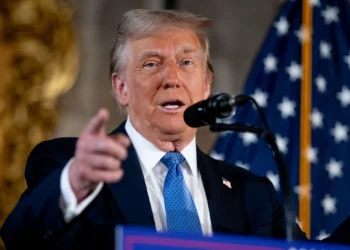In the bustling innovation hub of CoLab, Kaduna, three young men Fishon Amos, Mubarak Muhammad Aminu and Solomon Emmanuel, watch everyday financial friction and refuse to accept it. They build TAPNOB, a platform that embeds Bitcoin into ordinary transactions which includes buying groceries, paying bills and sending money to family. They refuse to settle for crypto speculation. They insist on practicality, usability and trust.
Why They Built TAPNOB
Fishon Amos serves as the CEO. He grew up between Kaduna, Abuja and Jos. He learned programming on his own before university. He immersed himself in roles ranging from backend engineering to freelancing. He doubled blockchain at first then he watched everyday Nigerians struggle with payments that take days, peers falling victim to P2P scams, remittance fees that bleed value. He saw a gap. He chose action.
Mubarak Aminu, CTO, calls himself a “tech intruder”. He studied computer engineering at Bayero University, Kano. At first, he built tools for coop finance and buy-now-pay-later in the construction industry. Then Bitcoin hooked him. He joined developer communities, worked on open-source Bitcoin tools and led BitDevs Kaduna. He wanted more than conversations. He wanted Bitcoin that people can use without fear.
Solomon Emmanuel serves as Principal Engineer. He holds a first-class degree in Computer Science from Landmark University. He began as an indie hacker, assembling projects end-to-end. He’s a small-project hardy: testing, secure and intuitive. He joined Amos and Aminu, driven by shared experiences of exclusion from financial tools. For him, security and reliability matter as much as innovation.
What TAPNOB Does
TAPNOB lets users transact Bitcoin safely and simply. It lets users pay for everyday things directly. It connects local merchants, mobile wallets and bank systems so that Bitcoin doesn’t lie idle. The founders designed it so users avoid haggling over fake rates, delay or high remittance fees. They built with compliance in mind. They work to ensure local laws don’t catch them off guard. In their first weeks after launch, TAPNOB handled over 1,500 transactions worth about $15,000. They partnered with Bitnob and Mavapay to validate that people want to use Bitcoin not just to hold it.
Challenges They Face And What Drives Them
They encounter regulatory uncertainty constantly. Nigerian laws around Crypto remain messy;enforcement varies, banks remain wary. They fight against user distrust: people have seen scams, fake exchanges, frozen accounts. They build trust step by step. They struggle with liquidity. They wrestle with currency fluctuations, banking bottlenecks and outages. Yet, they believe in their mission: letting someone walk into a store in Kaduna, tap their phone or card, pay with Bitcoin and leave without worry.
Their ambition drives them. They aim to double transaction volume monthly. They plan to refine user interfaces. They want stable asset support, better merchant integration and expansion beyond Nigeria. Within threebyears, they hope TAPNOB becomes a Bitcoin-native financial layer across Africa.
Why TAPNOB Matters
Africa often limps behind when payments feel hard. Many Africans use digital assets, yet conversion, usability and safety lag behind. TAPNOB bridges that lag. They don’t just offer a service, they build infrastructure people can rely on. They reshape how everyday Africans view money. They demand that global narratives about crypto shift from speculation to usefulness, from hype to habit.
When someone in Kaduna pays their light bill with Bitcoin, that event changes thinking. It challenges banks, regulators and merchants. It shows Bitcoin can live in streets, shops, homes etc not just in charts, tweets or debates.
TAPNOB stands at a turning point. If they can maintain compliance, build trust and scale both technology and reach, they will alter the financial landscape. They will show that Bitcoin’s real power lies not in price swings but in value delivered in real time. The trio from Kaduna remind us that real change starts where people pay, not just where they invest. And in that act, everyday becomes extraordinary.




